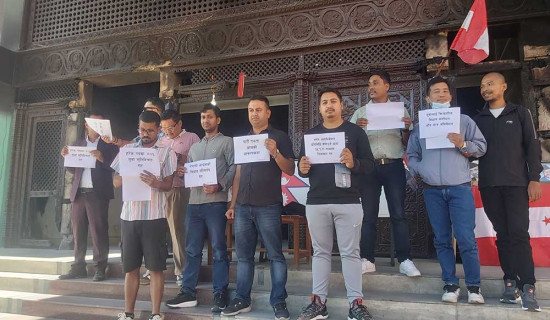- Saturday, 11 October 2025
Resolve Substance Abuse Problem
The widespread prevalence of drug addiction and alcoholism has reached epidemic proportions, posing severe threats to public health, social stability, and economic development. Substance abuse has become a pervasive issue affecting all segments of Nepali society. From urban centres to remote villages, no community is immune to the devastating consequences of addiction.
Substance abuse has significant consequences on public health and disease prevalence. According to recent studies, Nepal has one of the highest rates of drug abuse in South Asia, with an estimated 250,000 individuals addicted to drugs. Furthermore, alcoholism is also rampant, with alcohol-related problems accounting for a significant burden on healthcare services and social welfare systems.
Problem
Substance abuse, particularly drug addiction, can lead to an increased risk of various diseases. For example, injecting drugs can lead to the transmission of blood-borne diseases like HIV/AIDS and hepatitis. Substance abuse can also weaken the immune system, making individuals more susceptible to infections and diseases. Substance abuse has been linked to several mental health ailments. Many individuals who abuse substances also suffer from conditions like depression, anxiety, and bipolar disorder. These co-occurring disorders can exacerbate each other and lead to a higher burden of disease.
Substance abuse, especially opioid abuse, has contributed to a significant increase in overdose deaths worldwide. Opioid overdoses, in particular, have reached epidemic proportions in many countries, leading to a public health crisis. Several factors contribute to the epidemic level of substance abuse in Nepal. Poverty, unemployment, and lack of education are significant drivers, pushing vulnerable individuals towards substance abuse as a coping mechanism. Additionally, the country's porous borders facilitate the smuggling of drugs, making them easily accessible and affordable. Moreover, social stigma, limited access to treatment facilities, and inadequate awareness campaigns further exacerbate the problem.
The consequences of the substance abuse epidemic in Nepal are far-reaching and multifaceted. Firstly, there is a significant strain on the healthcare system, with drug-related illnesses and injuries burdening hospitals and clinics. Secondly, substance abuse leads to increased crime rates, including theft, violence, and domestic abuse, tearing apart the social fabric of communities. Furthermore, addiction hampers productivity, hindering economic growth and perpetuating the cycle of poverty.
Substance abuse affects not only the individuals involved but also their families and communities. It can lead to strained relationships, financial difficulties, and an increased burden on social services. The consequences ripple through society, affecting the overall well-being and stability of communities. Substance abuse inherently places a heavy burden on the healthcare systems of the country and is a particularly burdensome issue in resource-poor countries. The costs associated with treating substance-related health issues, emergency room visits, rehabilitation programmes, and long-term care can be substantial. These costs are mainly borne out-of-pocket and often borne by the public through taxes or increased insurance premiums.
To combat this epidemic, a multi-faceted approach is required. Firstly, the government must allocate more resources to improve access to affordable and quality treatment facilities. This includes expanding rehabilitation centres, training healthcare professionals, and establishing helplines for individuals seeking assistance. Secondly, public awareness campaigns should be intensified to educate the population about the dangers of substance abuse and reduce the associated stigma. Additionally, law enforcement agencies must strengthen border control measures to curb drug trafficking and disrupt the supply chain.
Interventions
The epidemic level of substance abuse in Nepal demands immediate attention and concerted efforts from all stakeholders. Failure to address this crisis will have severe long-term consequences for public health, social stability, and economic development. People struggling with substance abuse often face social stigma and discrimination, which can prevent them from seeking help or accessing appropriate healthcare services. This stigma can perpetuate the cycle of substance abuse and hinder efforts to address the issue effectively.
Substance abuse places a substantial economic burden on healthcare systems and society as a whole. The costs associated with treating substance-related disorders, managing associated diseases, and addressing the social consequences are significant. Substance abuse can contribute to public safety issues, including impaired driving, violence, and crime. These consequences further strain public health resources and impact community well-being. Addressing substance abuse requires a comprehensive approach involving prevention, treatment, and harm reduction strategies.
It is crucial to prioritise public health interventions that aim to reduce substance abuse and its associated consequences to improve overall well-being and disease prevalence. Substance abuse affects not only the individuals using drugs but also their families and communities. It can lead to strained relationships, domestic violence, child neglect, and financial instability. Communities may experience increased crime rates, decreased productivity, and a decline in overall well-being.
The substance abuse crisis in Nepal necessitates collaboration between the government, civil society organisations, and international partners. International support, both financial and technical, is crucial to enhance Nepal's capacity to tackle this issue effectively. Partnerships with neighbouring countries can facilitate intelligence sharing and joint efforts to combat drug trafficking.
By tackling the consequences of substance abuse on public health, societies can work towards reducing the burden and improving overall well-being. By implementing comprehensive strategies, increasing awareness, and providing accessible treatment options, Nepal can begin to reverse this devastating trend and offer hope to those affected by addiction. Hence, it is time to act decisively and save lives.
(Dr. Lohani is the clinical director at the Nepal Drug and Poison Information Centre. lohanis@gmail.com)
















